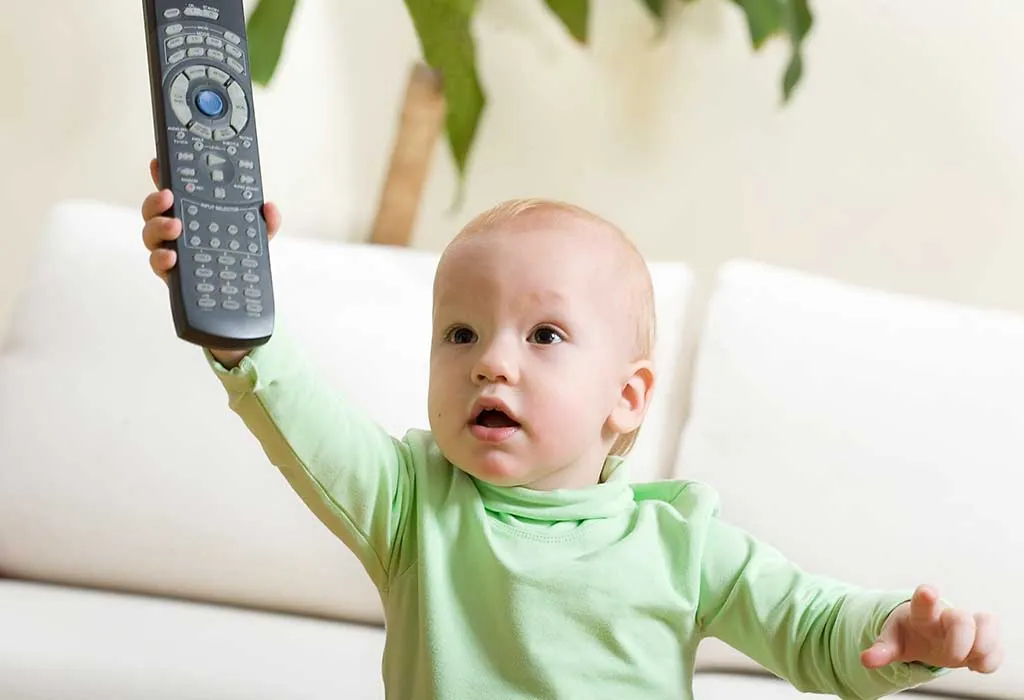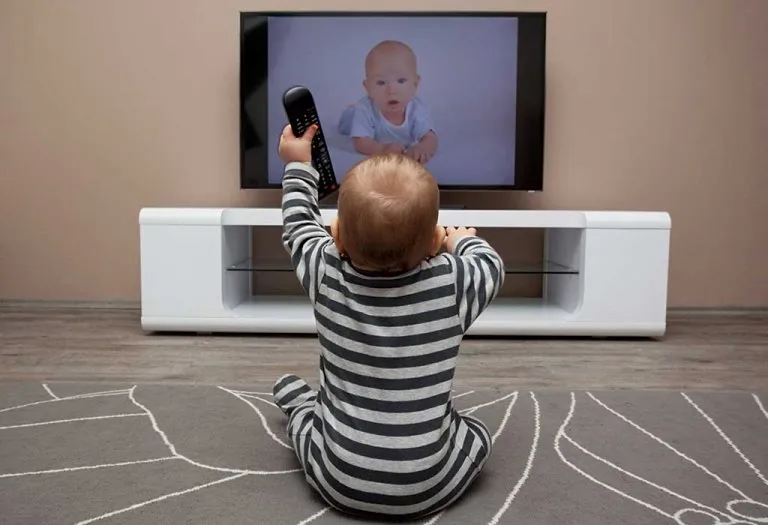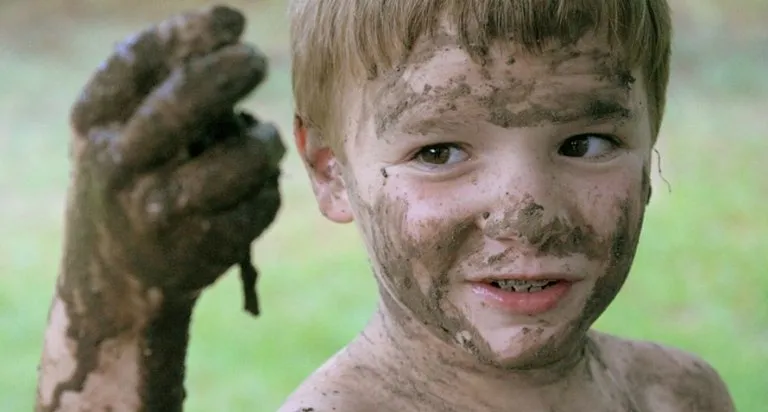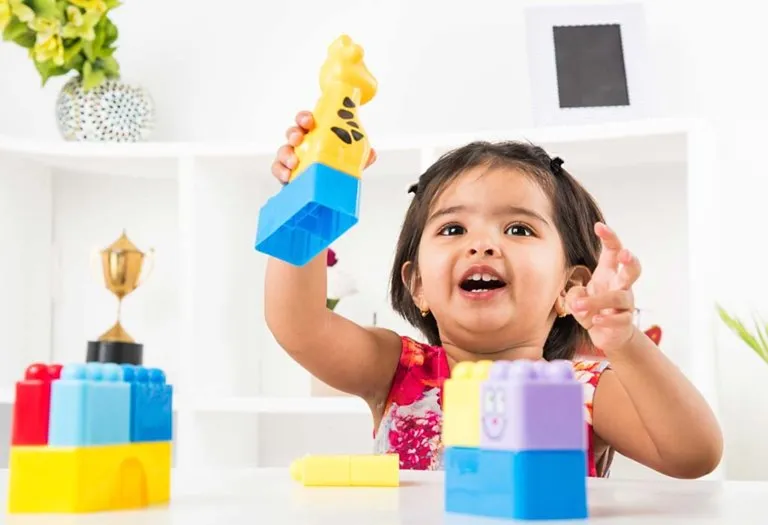Babies & Watching TV: Is It Safe?
- How Safe Is It for Babies to Watch TV?
- What Is the Right Age for Babies to Watch TV?
- What Can Be the Effects of Watching TV on Babies?
- Other Alternatives to TV Watching For Babies
- Tips for Safe TV Viewing for Babies
- FAQs
Watching TV may be entertaining, but is watching tv suitable for babies? Too much watching TV harms the babies’ health. Because infants like seeing vivid colors, don’t force them to watch one station after another as you watch TV. Instead, begin with a single member of the family and work your way up.
Too much television, according to research, may have several harmful consequences, including stunted brain development, diminished brain stimulation, learning difficulties, restless sleep, nightmares, and a lack of focus. Furthermore, relations between babies watching TV and autism may also be present, further presenting reasons for you to keep them away. Keep reading for some safety tips to keep yourself and your children safe when you’re binge-watching TV.
How Safe Is It for Babies to Watch TV?
According to the American Academy of Pediatrics, children under 18 months of age should not watch television (1). While many parents understand that watching TV is bad for their children, the majority are unaware of the negative impact that television can have on young children, especially when music is playing in the background. Babies’ ability to recognize and control their dissatisfaction is impaired as a consequence of extended screen exposure. It also diverts kids from activities that benefit their mental capability, such as exploring and interacting with other children.
What Is the Right Age for Babies to Watch TV?
So, when can babies watch TV? As parents, the question, ‘when is TV viewing safe for babies?’ must be daunting to you quite often. Several studies have found that watching television before 18 months has a long-term negative impact on children’s language development, reading abilities, and short-term memory. As a result, sleep and concentration issues are exacerbated.
What Can Be the Effects of Watching TV on Babies?
Many parents are pleased that various TV programs serve as excellent babysitters and keep children busy while their parents are at work. Parents who watch these programs with their children do not feel bad since they provide ‘quality time’ for their children. But are TV screens bad for babies? Indeed, there is a possibility that the effects of watching TV might be harmful to babies. Check out these effects of TV on infants.
1. Hampers Brain Development
Babies gain nothing from watching TV because they are too young to understand what they see. They like the bright and colorful images but can’t connect them to real-life objects. For example, if they see a toy on TV that they already have, they won’t realize it’s the same toy.
Newborns watching TV regularly can make the babies pay more attention to the screen than to real life, which can affect their brain development. Research shows that TV offers no learning benefits for babies, so there’s no reason for them to watch it (2). Another example is when your kid grins at the television, the television does not reciprocate by smiling back. As a consequence, he may suffer damage to his social and psychological well-being.
2. Lose Chances of Social Interaction
Playing is an excellent method for your child to get acquainted with their environment. He learns how to connect his brain via cause-and-effect experiments. Each time your child interacts with another individual, a developmental milestone is achieved. Your child will lose out on these changes if they are hooked to the screen (3).
3. Impacts Baby’s Communication Skills
Watching TV or listening to music won’t help a baby learn to speak. Babies need interaction and attention from adults to develop communication skills. Ignoring a child’s attempts to communicate can cause them to miss important developmental milestones (4). Listening to cartoon characters speaking in babyish tones does not aid in language development. Instead, children learn to communicate by imitating the speech patterns of adults around them. Additionally, prolonged TV viewing can harm children’s ability to communicate effectively through reading and writing and may lead to concentration and learning difficulties over time.
4. Disrupts Healthy Eating Patterns
Watching TV can disrupt healthy eating patterns (5). Eating while watching TV can prevent the brain from recognizing fullness, leading to overeating. Conversely, some children may eat less due to the distraction of television. Although specific studies on babies are lacking, similar effects might occur, particularly in older babies who eat more solid foods. Over time, this can contribute to malnutrition, either through overeating or undereating.
5. Hampers Healthy Vision Development
Children blink less frequently than adults when watching TV, leading to eye strain, redness, and blurred vision. Constant focus on nearby TV images can make it challenging for a child’s eyes to adjust to distant objects, taking hours to re-focus. Regular TV viewing can worsen short-term eye issues and may increase the likelihood of developing myopia (nearsightedness) early in life, necessitating prescription glasses. According to the CDC, a significant percentage of children aged 2-17 spend more than two hours on screens daily, with 65.7% of boys and 64.6% of girls affected (6).
6. Interferes With Sleep Quality and Routines
Regular TV watching can disrupt a baby’s sleep patterns and bedtime routine, especially if done in the evening. It may reduce nighttime sleep hours as stimulating TV content can keep the brain active even after turning off the TV. Additionally, blue light emitted from TV screens can suppress melatonin production, a hormone crucial for regulating the sleep-wake cycle (7).
7. Misguiding Programs
Most children’s programs and films teach kids incorrect skills due to their target audience. They misrepresent the problem by depicting reality in an exaggerated and cartoonish manner.

Other Alternatives to TV Watching For Babies
While television does not harm children in and of itself, you may have heard many people questioning, “Is watching TV bad for babies?” The answer would be that excessive viewing is bad and may result in sedentary habits and a lack of exposure to various educational possibilities. Children should be exposed to a range of experiences frequently to ensure a well-rounded upbringing. When you include healthful activities into your child’s daily routine, they will acquire a broader range of skills, talents, and experiences than they would without.
When youngsters engage in a variety of activities, they develop into more well-rounded and balanced individuals. Keep a note of the following alternatives to keep babies engaged (8):
1. You May Use Chalk or Paint to Sketch on the Sidewalk
Prepare a colorful box of sidewalk chalk or paint for the children to enjoy on bright, sunny days. Drawing drawings, forming shapes, and writing numbers and letters with your kid may be a lot of fun. You might arrange a playdate with friends or participate in creative activities with your kid . Maintain a record of your child’s accomplishments and share them with family and friends.
2. Helping in Some Manner in the Kitchen
Bring your kid along and allow them to help you with the cooking process. You may also engage them to aid in measuring, mixing, and stirring. Even little children are capable of washing fruits and vegetables and assembling meals in novel ways. It is essential to teach youngsters about nutrition so they may develop a more holistic view of health. When children assist in the kitchen, they develop essential skills such as counting and measuring. Cleaning, rearranging, and mixing things may help youngsters develop their motor skills and teach them critical cooperative qualities.
3. Read
Allow your kid the time and space to study books and periodicals alone or read with them. Choose picture books with big, vibrant pictures to pique your child’s interest in the story. Even if you just read a book for a few minutes a day, you will enhance your child’s growth. Every age group may benefit from reading’s joy, involvement, and security.
4. Engage in Some Physical Exercise and Spend Some Time Outdoors
Toys in the yard, biking, walking, and playing with friends are all enjoyable ways for your kid to get some exercise while enjoying the outdoors. Here are a few suggestions to help you get some fresh air and exercise:
- Visit the park and engage in some barbecuing.
- Take a walk in the woodland.
- Take them along to discover nature in your backyard or on a path.
- Visit a zoo or another location where animals are free to wander.
- Participate at the playground or park in your area.
- Acquire expertise in one of the following activities: fishing, swimming, or snorkeling.
- Sandboxing and sandcastle construction are popular hobbies.
- It is essential to develop athletic skills via participation in sports or other activities (like throwing and catching)
5. Create a Drawing or a Painting
Additionally, you’ll need a paper or a canvas on which to create your masterpiece. Allow your kid to express themselves artistically via paintings, drawings, and written words. Additionally, they may construct their birthday and holiday cards by hand.
6. Perform Some Kind of Music
Set the tone by playing music and allowing your kid to relax and absorb everything. It’s critical to include a range of musical styles, including classics, dynamic rhythms, and ambient sounds. Play an instrument in front of your kid for a more satisfying musical and family experience. Music listening has been shown to benefit children’s brain development, particularly in pattern recognition and rhythm.
7. Create Something Entirely From Scratch
Your kid may construct structures out of various items, including forts, homes, spacecraft, pillows, and even a deck of cards or a snowball. When your kid creates anything, they will learn the following:
- Strengthen their motor and coordination capabilities.
- Increase their self-esteem and ability for creative thinking.
- Examine the impact of combining and matching different shapes and sizes.
- Enhance your motor abilities by experimenting with various activities.
- Collaborate with other children
Tips for Safe TV Viewing for Babies
Due to the abundance of content on television that is inappropriate for children to watch, parents must choose appropriate programs for their children to watch. While a baby may like watching tv, it is not something they should do until they are old enough to understand the dangers. Parents need to be vigilant for these kinds of hazards. Otherwise, their child may have difficulty sleeping and end up roaming.
So, is it ok for baby to watch TV? The following are some tips on how to watch television with your baby safely:
- Keep an Eye on Children When They Are Watching Television: The activity may be as easy as playing an educational game or as involved as discussing something you both saw on television or in an age-appropriate film.
- Conduct Research Before Purchasing Games or Applications for Your Kid: While many applications and games advertise themselves as educational, the reality is that this is not always the case.
- Conduct an Online Search: This is to see which ones educators and physicians believe are the finest. If possible, review the material before exposing your kid to it.
- Schedule Enough Time in Your Child’s Daily Routine: Scheduled daily exercise will assist them in interacting with people and things other than screens. Without enjoyment, it is impossible to learn or develop as a creative person. Encourage your kid to engage in regular physical activity as well.
- You Should Turn Off All Screens During Meals and an Hour Before Sleep: During mealtimes and at least an hour before bedtime, you should switch all screens off. It would be best to keep electrical devices such as televisions and other gadgets out of the bedroom.
- Avoid Becoming a Poor Role Model: Avoid becoming a flawed role model for others; instead, be a positive one. When not in use, turn off all screens, including televisions. Never leave a screen on when you are with your kid, and turn off your phone when you are not. This may have a detrimental effect on both your relationships and your child’s leisure time.
FAQs
1. Is background TV harmful to babies?
Yes, background TV can be harmful. Even if a baby is not actively watching, the noise and movement can distract them from play and learning activities, potentially impacting cognitive development.
2. Are educational programs beneficial for babies?
While educational programs are designed to be beneficial, babies under two years old do not gain significant learning from them. Personal interaction with caregivers is far more effective for their cognitive and social development.
3. How does watching TV affect a baby’s physical health?
Watching TV can contribute to sedentary behavior in babies, leading to potential physical health issues such as poor motor skill development and an increased risk of obesity. Babies need active play and movement to develop their physical abilities and overall health.
This was all about babies and TV. If you’re a parent who wants to keep these safety guidelines and tips close at hand so that your baby can watch television in a relaxed and secure environment, this article is for you. So, before allowing your baby to watch TV for an extended time, keep these safety precautions impact of watching TV on babies and guidelines in mind.
References/Resources:
1. Why to Avoid TV for Infants & Toddlers; American Academy of Pediatrics; https://www.healthychildren.org/English/family-life/Media/Pages/Why-to-Avoid-TV-Before-Age-2.aspx
2. Schmidt. M, Rich. M, ifas-Shiman. S, Oken. M, Taveras. E; Television Viewing in Infancy and Child Cognition at 3 Years of Age in a US Cohort (Pediatrics); National Library of Medicine; https://www.ncbi.nlm.nih.gov/pmc/articles/PMC4042392/; June 2014
3. Kim. S, Wi. D, Kim. K; Effect of Media Exposure on Social Development in Children (Global Pediatric Health); Sage Journals; https://journals.sagepub.com/doi/10.1177/2333794X231159224; March 2023
4. Byeon. H, Hong. S; Relationship between Television Viewing and Language Delay in Toddlers: Evidence from a Korea National Cross-Sectional Survey (PLoS One); National Library of Medicine; https://www.ncbi.nlm.nih.gov/pmc/articles/PMC4365020/; March 2015
5. Probing Question: Does eating while watching TV harm kids?; Penn State University; https://www.psu.edu/news/research/story/probing-question-does-eating-while-watching-tv-harm-kids/
6. QuickStats: Percentage* of Children† Aged 2–17 Years With >2 Hours of Screen Time Per Weekday,by Sex and Age Group — National Health Interview Survey, United States, 2020 (Morbidity and Mortality Weekly Report); CDC; https://www.cdc.gov/mmwr/volumes/71/wr/mm7103a6.htm
7. Helm. A, Spencer. R; Television use and its effects on sleep in early childhood (Sleep Health); Science Direct; https://www.sciencedirect.com/science/article/abs/pii/S2352721819300580; June 2019
8. 21 learning activities for babies and toddlers; UNICEF Parenting; https://www.unicef.org/parenting/child-care/21-learning-activities-babies-and-toddlers
Also Read:
Best TV Shows for Infants
Ways to Control the Screen Time for Your Baby
Wonderful Ways to Keep Your Baby Safe and Protected
Was This Article Helpful?
Parenting is a huge responsibility, for you as a caregiver, but also for us as a parenting content platform. We understand that and take our responsibility of creating credible content seriously. FirstCry Parenting articles are written and published only after extensive research using factually sound references to deliver quality content that is accurate, validated by experts, and completely reliable. To understand how we go about creating content that is credible, read our editorial policy here.




















.svg)


















